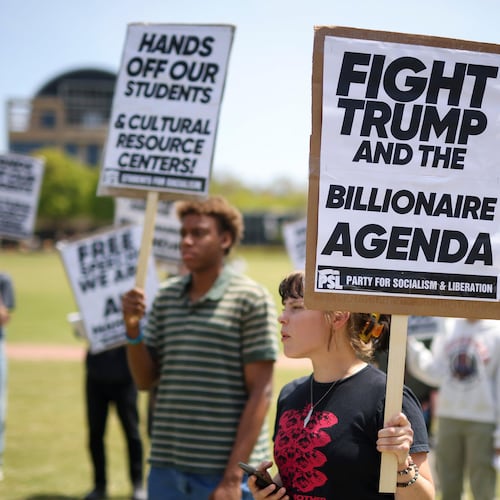As a new WNBA season approaches, Amy Crawford doesn’t know whether she and her wife will renew their season tickets with the Atlanta Dream. And it has nothing to do with how the team played last season.
Crawford, a project manager at a software company, is considering giving them up in response to co-owner Kelly Loeffler's appointment as Georgia's next U.S. senator and her pledge of "unapologetic" support for President Donald Trump.
“I’m having a hard time understanding,” Crawford said. “We paid, what, more than $7,000 for our tickets last year to line the pockets of someone who now as a public figure is going to be opposed to all of the things that keep me safe?”
The tension illustrates the complexities of Loeffler’s new position as she prepares to take office Monday, when she’ll be sworn in by Vice President Mike Pence at a brief ceremony in Washington.
She's the co-owner of a WNBA franchise with a long history of appealing to black and LGBTQ fans — a bloc of reliably Democratic voters that polls consistently show overwhelming opposition to Trump in Georgia.
Already, Loeffler’s role with the WNBA has loomed large in the 2020 race.
As her name emerged as a likely choice by Gov. Brian Kemp to succeed the retiring Johnny Isakson in the Senate, conservative activists circulated photos of the Dream in June celebrating LGBTQ rights and shared reminders of the team’s stance on a hot-button legislative debate.
More: Georgia's incoming senator embarks on a grassroots roll-out
More: Lobbying by incoming Georgia senator's firm under scrutiny
A league initiative that gave fans an option to donate a portion of ticket sales to Planned Parenthood, an influential abortion rights group, also triggered pushback from anti-abortion activists who tried to paint Loeffler as lukewarm on the issue.
And pictures of her midcourt smiling beside Democrat Stacey Abrams, Kemp’s political archrival, at an Atlanta Dream playoff game quickly became ammo for some grassroots activists eager to cast Loeffler as a closeted liberal.
“We don’t need someone that plays both sides of the fence,” Amy Kremer, a tea party organizer who ran for Congress in 2017, said of the photo taken shortly before the 2018 election. She added: “There is outrage over this decision, and people are mad as hell with good reason.”
Loeffler has pitched her stake in the team as an outgrowth of her passion for sports — she was a standout basketball player while growing up in rural Illinois — and not a way to build a political profile.
"I bought the Atlanta Dream because I love basketball," Loefller told The Atlanta Journal-Constitution. "I wanted to do something for the city of Atlanta, for the Southeast, for sports. I did not buy the team for political purposes or political statements."
‘American Dream’
The governor said in an interview that Loeffler’s private-sector experience as a WNBA co-owner and senior executive with the Intercontinental Exchange — which owns the New York Stock Exchange — will prove to be one of her most formidable strengths when she campaigns for this year’s special election to fill the final two years of Isakson’s term.
“She’s living the American dream. She wants the dream to continue,” Kemp said. “And she’s willing to fight to keep it that way to keep socialism from taking over if you have an Elizabeth Warren or Bernie Sanders presidency.”
Still, she's quickly distanced herself from what could be a liability in conservative circles, including the franchise's opposition to "religious liberty" legislation, one of the thorniest debates in state politics.
Many supporters of such legislation see it as a way to defend against what they view as a siege on Christian values and provide more legal protection to the faith-based. Critics say such measures amount to legalized discrimination and warn of boycotts and other financial fallout if they become law.
Loeffler, pressed by the AJC, indicated that she shared Kemp’s support for passing a version of religious liberty legislation.
"I think people of faith should be protected. And we should all be able to act according to our religious beliefs," she said in the interview, adding: "And we should treat all people with love and respect."
A champagne shampoo
Loeffler isn’t the first Georgia pro sports owner to face a complicated transition to politics.
Former Gov. Carl Sanders owned part of the expansion Atlanta Hawks team during his 1970 comeback bid for governor against Jimmy Carter, a bitter battle that played out in a Democratic primary.
More: AJC Interview: Loeffler vows to fight 'impeachment sham'
More: Inside how Kemp picked Loeffler for the U.S. Senate
The race was jolted by a photo of Sanders getting doused by champagne from a black player during a celebration — an image that Sanders long said was meant to stoke fears among segregationists who then held sway in Georgia's Democratic electorate.
"Carter had that reproduced and had that sent all over the state (with the underlying message) 'Here's Carl Sanders making love with the blacks,' " Sanders told the AJC before his death in 2014. Sanders lost that contest to Carter.
Credit: Charles Pugh
Credit: Charles Pugh
Loeffler faces unique challenges, in part because she’s hardly known by many of the Republican officials who will determine whether she wins in November — and whether she can withstand a possible challenge from U.S. Rep. Doug Collins or another conservative.
Howard Franklin, a Democratic strategist, said Loeffler’s “hard edge” debut was meant as a pre-emptive strike to calm concerns from conservatives who worry about her ties to the WNBA and other links to causes they perceive as liberal.
“What’s really interesting to me, as a strategist, is that she’s more afraid of a primary from her right than a need to get to the middle and be a centrist leader for all the citizens of Georgia,” Franklin said.
‘Stay in my lane’
Top WNBA officials and prominent players have maintained a studious silence about Loeffler’s appointment, despite multiple attempts by the AJC and other sports journalists to gauge their reaction. Many of the players are out of the country until training camp opens in a few months.
The team said in a recent statement that it’s not a “political entity” and is focused on “building a successful team on the court and creating a top fan experience.”
One of the few WNBA officials to talk was Dream head coach Nicki Collen. She told the AJC that Loeffler is a supportive owner, though she added that most WNBA players are likely politically out of step with Loeffler's conservative views.
“They may not be too excited about her political views, but I don’t think that affects what they think of Kelly Loeffler,” Collen said. “She gives them a job, quite frankly, and without owners like her and Mary (Brock) they wouldn’t have this job in this country.”
Collen added that she’s never talked politics with Loeffler, a financial executive who sits courtside at most Atlanta Dream home games but leaves important decisions, like draft choices, up to team executives.
“I’ll stay in my lane,” Collen said.
‘Tough’
Loeffler’s appointment comes at a pivotal time for the team, which will start its 13th season in Atlanta in 2020 and its 10th under Loeffler and Brock.
The organization will move this season from State Farm Arena in Atlanta to the much smaller Gateway Arena in College Park as it explores new ways to build its fan base. The team averaged 4,270 fans in 2019, the second-lowest attendance in the league.
That’s what gives some longtime fans such queasiness. Several who spoke to the AJC said they didn’t want to support Loeffler’s policies but also didn’t want to hurt a league that is still in a growing phase.
Among them is Steve Wolfingbarger, a hospitality executive who has attended Dream games since 2008. He said he’s particularly worried about Loeffler’s stance on religious liberty legislation that LGBTQ groups say give legal protection to opponents of same-sex marriage.
“My disappointment in Loeffler is that as a person that has a strong number of LGQBT players, fans and possibly employees, it is disheartening that she has decided to support the religious freedom legislation,” he said. “That hurts the community that is a big part of the Dream and WNBA.”
Crawford, the software executive, is also torn between her passion for the WNBA and her fears that supporting the Dream franchise amounts to a tacit endorsement of its conservative co-owner.
“Is it worth making the investment so I can see great players play and have them be an inspiration and be a part of that audience that helps validate what they strive so hard to do with their passion? I don’t know,” Crawford said. “It’s going to be tough.”
Keep Reading
The Latest
Featured







